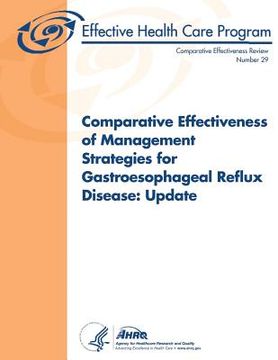Comparative Effectiveness of Management Strategies for Gastroesophageal Reflux Disease: Update: Comparative Effectiveness Review Number 29 (en Inglés)
Reseña del libro "Comparative Effectiveness of Management Strategies for Gastroesophageal Reflux Disease: Update: Comparative Effectiveness Review Number 29 (en Inglés)"
Gastroesophageal reflux disease (GERD) is one of the most common health conditions affecting Americans. A study of an employed population in the U.S. estimated that more than 11,000 of 267,000 employees (4 %) suffered from GERD, contributing an average incremental cost to the employer of $3,355 per employee during a 3-year observation period-approximately 65 % related to prescription drugs. At the same time, it is well recognized that some drugs used to treat GERD (such as proton pump inhibitors) are overprescribed. A number of patients have frequent severe symptoms requiring long-term regular use of antireflux medications. For these individuals with chronic GERD, most authorities consider the goals of therapy to be an improvement in symptoms and quality of life, healing and maintenance of healed erosive esophagitis, and prevention of complications. However, there remains considerable uncertainty regarding how these objectives should be achieved. Among patients treated medically, several approaches are used, depending in part on the severity of symptoms and clinical response. These include intermittent, periodic, or continuous use of prescription or over-the-counter medications, especially histamine type 2 receptor antagonists (H2RAs) and proton pump inhibitors (PPIs). The availability of surgery and, more recently, endoscopic treatments has further complicated the choice among management strategies. The first Comparative Effectiveness Review (CER) published by the AHRQ focused on GERD. Key Questions addressed in that report concerned the comparative effectiveness of medical, surgical, and endoscopic treatments for improving objective and subjective outcomes in patients with this disease. The report also examined the relative efficacy of these interventions in specific patient subgroups as well as adverse event profiles. A number of developments since the publication of the 2005 review have necessitated an update. Among them are the publication of approx. 3,000 new studies; the introduction of novel drugs; the recognition of new drug safety considerations; and the withdrawal of previously approved endoscopic interventions and introduction of new endoscopic interventions. Also notable was the publication of a new consensus definition of GERD in 2006. The current report addresses developments in the treatment of GERD in adults and additionally includes sections on treatment of extraesophageal syndromes, including chronic cough, laryngitis, and asthma, which an expert panel considered to be of particular clinical importance. Key Questions in this review include: KQ1. What is the evidence of the comparative effectiveness of medical, surgical, and other newer forms of treatments for improving objective and subjective outcomes in patients with chronic GERD? Is there evidence that effectiveness varies by specific technique, procedure, or medication? Objective outcomes addressed include esophagitis healing, ambulatory pH, other indicators of reflux, need for medication, health care utilization, and incidence of esophageal stricture, Barrett's esophagus, or esophageal adenocarcinoma. Subjective outcomes include symptom frequency and severity, sleep/productivity, and overall quality of life. KQ2. Is there evidence that effectiveness of medical, surgical, and newer forms of treatments varies for specific patient subgroups? What are the characteristics of patients who have undergone these therapies, including the nature of previous medical therapy, severity of symptoms, age, sex, weight, and other demographic and medical factors? What are the provider characteristics for procedures, including provider volume and setting (e.g., academic vs. community)? KQ3. What are the short-term and long-term adverse events associated with specific medical, surgical, and other newer forms of therapies for GERD? Does the incidence of adverse events vary with duration of followup, specific surgical intervention, or patient characteristics?

